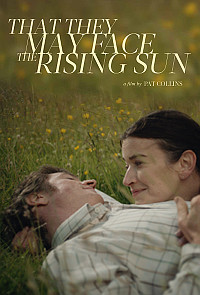| SHADOWS ON THE WALL | REVIEWS | NEWS | FESTIVAL | AWARDS | Q&A | ABOUT | TALKBACK | |||||||||||||
 Shadows off the beaten path Shadows off the beaten pathIndies, foreigns, docs and shorts...
On this page:
HAAR |
MIND-SET |
THAT THEY MAY FACE THE RISING SUN
| |||||||||||||
| See also: SHADOWS FILM FESTIVAL | Last update 11.Oct.23 | |||||||||||||
|
Haar Review by Rich Cline | 
| |||||||||||||
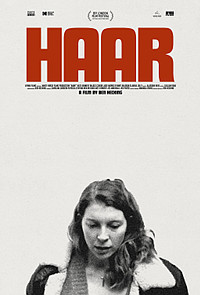 dir-scr Ben Hecking prd Carolina Cordero, Patricia D'Intino, Ben Hecking, Kate Kennedy, Jez Marshall, Leo Pinter with Kate Kennedy, Balazs Czukor, Fehinti Balogun, Claudia Jolly, Jack Morris, Eva Magyar, Andras Marton, Will Brown, Grace Chilton, Jesse Stanley, Deborah Findlay, Maddie Rice release UK Oct.23 lff 23/UK 1h23  Is it streaming? |
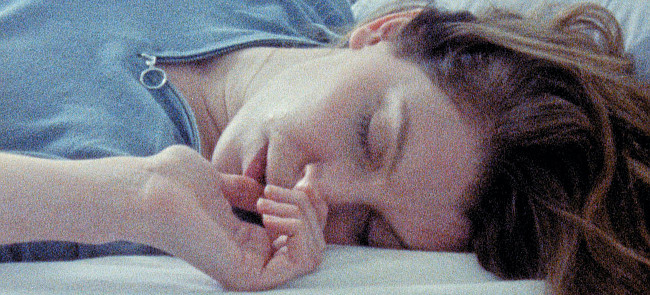 Shot on wonderfully grainy Super 8 film, this British drama maintains a loose, observational structure following a young woman around a European city. Filmmaker Ben Hecking captures knowing details everywhere, with witty encounters and a few amusing surprises. It's a free-flowing series of scenes that are punctuated with a range of emotion from silliness to anguish. The meandering approach is a bit challenging, but it's worth sticking with it. In Budapest, filming has just wrapped on a TV series, and production manager Jef (Kennedy) is tying up loose ends. Her driver Laszlo (Czukor) is helping her make last-minute deliveries, as she receives word that her father has had a heart attack. But the airport is closed, so she can't leave. Instead, she runs a few more errands, attempts cam sex with her boyfriend and attends a party. Of course her mind is elsewhere, so it's difficult to connect with anyone. Then at the end of the day, she finds someone she can talk to. Much of the film is dialog-free, with extended sequences featuring only ambient sound as Jef circles around various locations, lost in her feelings. This creates a thoughtful vibe, even as she breaks her reverie to go about a series of specific activities. The various people she meets along the way and speaks to on the phone each have an impact on how she is feeling. And a range of situations and details emerge to suggest underlying things about her life. With deadpan, soft-spoken dialog, Kennedy beautifully underplays Jef, revealing her hidden internal emotions in the smallest flickers of her facial expressions. She holds her feelings inside when she's around other people, telling no one what she's going through. So when she finally opens up, it's powerfully moving because she never exaggerates it at all. Everyone around her feels bracingly realistic, naturally oblivious to the seriousness of what she is going through. The film's hushed tone isn't always easy to connect with, as it relies on our ability to identify with Jef's odyssey. These experiences are pushing her to evaluate the decisions she has made in her life, revisiting her childhood and questioning where she is now. Because the film is shot like in a relaxed style, with a square frame and rounded corners, much of this feels like an old-fashioned home movie. And this helps give the central themes about isolation and identity a timeless kick.
| ||||||||||||
|
Mind-Set Review by Rich Cline | 
| |||||||||||||
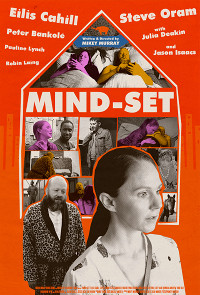 dir-scr Mikey Murray prd Mikey Murray, Josh Mandel, Darren Scales with Eilis Cahill, Steve Oram, Peter Bankole, Julia Deakin, Jason Isaacs, Pauline Lynch, Rhiannon Wyn, Andrew John Tait, Robin Laing, Philip Stevens, Lucy-Jane Quinlan release US Apr.22 cff, UK 6.Oct.23 22/UK 1h29 Is it streaming? |
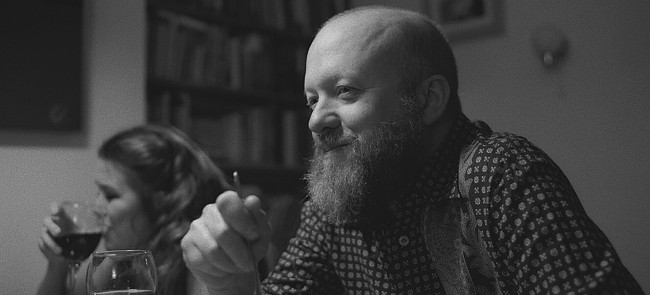 A scrappy, low-budget charm infuses this British comedy, which is shot in black and white with the occasional colourful flourish to emphasise its quirky characters and situations. Each of the central characters is struggling to find a sense of balance, making decisions that might not be helpful simply because they don't take each other's thoughts or feelings into consideration. The mixture of sweet and sour is witty and astute. In a stale job, Lucy (Cahill) has stopped taking her meds because they give her brain fog. So she's particularly alert to the ongoing frustration in her relationship with lazy live-in boyfriend Paul (Oram). Wondering what she should do about this, she begins flirting with sexy new work colleague Daniel (Bankole). As they start hanging out, he teaches her to play squash, annoying the tennis-obsessed Paul. And Lucy decides that maybe sex with Daniel is the answer. Meanwhile, Paul's script has drawn the attention of successful filmmaker Nick (Isaacs), who wants to direct the movie. Loose-limbed storytelling brings scenes to life, allowing for improv-style performances that ripple with wit and attitude. The title refers both to Lucy's fragile mental health and a comment she makes about how people place themselves on pedestals above each other, seeing the world out of perspective. This is cleverly reflected in a series of amusingly awkward conversations and parties involving these oddball characters. So where the story goes is bittersweet and sometimes even sad, as the more overt comedy gives way to darker honesty. Performances are deadpan, laced with bone-dry wit. Cahill gives Lucy an astonishing cruel streak, as she occasionally snaps with brutal honesty. But she's also genuinely trying to sort out her life, realising that neither staying with Paul nor running off with Daniel will solve her problem. Oram is impeccably insufferable as the hapless Paul, while Bankole's Isaac is a nice guy who finds himself in an unexpected position. In exasperation, Lucy says to the thoughtless Paul, "I wish you could step into my body just once," to which he offers a predictably glib reply. For each of these people, nothing is going the way they expect it to. And as the story continues, it's Lucy who emerges as the least likeable person on-screen, mainly because she hates herself. Her journey through this narrative is tough and truthful, with multiple angles that add surprising resonance and perhaps a hint of hope.
| ||||||||||||
|
That They May Face the Rising Sun Review by Rich Cline | 
 Is it streaming?
| 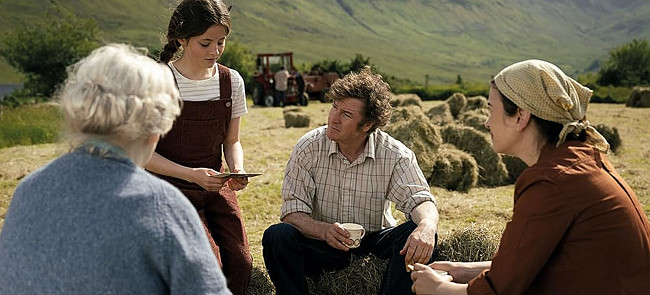 Based on John McGahern's acclaimed novel, this gentle 1980s-set Irish drama has a documentary tone, observing a year in the everyday life of a rural community. The sense of place is immersive, surrounded by epic verdant fields, mountains and lakes. And there's poetry in the musings of older characters who make knowing observations about everything. This sometimes feels a bit overwritten, but the film is packed with lovely insight. Having returned to Ireland five years ago, Joe (Ward) and his wife Kate (Bederke) spend their days farming, keeping bees and chatting with neighbours. Joe is writing a novel, while Kate continues to work with her art gallery back in London. Their friends include Jamesie and Mary (Dolan and McCabe), while Jamesie's brother Johnny (McGinley) visits from England, sparking some bitter words from lively hermit farmer Patrick (Roddy). Then Kate's gallery partner (Conlon) arrives to tell her he wants to sell up, raising the question of whether she should move back to run it. Philosophical musings fill the dialog, as elderly men contemplate the meaning of life, noting that everyone goes to church but few believe. And no one admits the truth that the rain falls, the grass grows and that's about all there is. Patrick criticises Joe and Kate for wanting a quiet life, when solitude has always been a struggle for him. But this community is remarkably tight; people pitch in for each other while staying on top of the gossip. They're more like family than neighbours, so drama often erupts in their conversations. Performances have an honest thoughtfulness. Ward brings an earthy charm that interacts beautifully with Bederke's observant Kate. Without the gallery it will feel like she's only living day to day, and that's exactly what Tom loves about this place. And Kate is also learning ancient local skills that are in danger of disappearing. The surrounding cast of character actors creates vivid people whose distinct past experiences shape their present-day opinions. This is a remarkably calming film, removed from the fast-pace of urban life and deeply connected to both the land and the past. Seasons change in gradual ways, and connections shift over the months. As Patrick observes, "There's a big difference between landing and belonging." And as he ages he begins to feel like maybe he doesn't belong here any more. The film's tone is sometimes lively, such as at a Christmas dinner or wedding, and ultimately elegiac at a funeral.
| 
See also: SHADOWS FILM FESTIVAL © 2023 by Rich Cline, Shadows
on the Wall
HOME | REVIEWS | NEWS | FESTIVAL | AWARDS
| Q&A | ABOUT | TALKBACK | | ||||||||||


